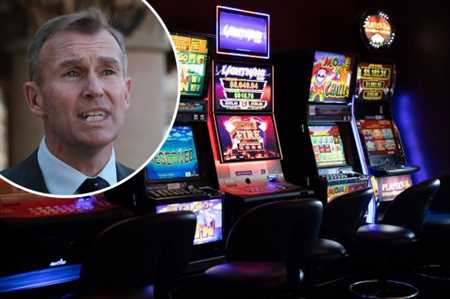

As economic turbulence continues to affect various aspects of daily life, certain behaviors remain steadfast, revealing a complex relationship between financial stress and recreational choices. While individuals grapple with tightened budgets and escalating expenses, their engagement in leisure activities can sometimes seem paradoxical. This phenomenon raises important questions about priorities and the impact of external pressures on personal habits.
The allure of entertainment, particularly in the realm of gaming, has a profound hold on many. Even in situations where disposable income is scarce, some individuals find solace in the thrill of chance and the excitement that accompanies it. This dynamic reveals underlying motivations that can conflict with common notions of financial prudence.
Recent findings indicate a staggering figure regarding unregulated expenditures in this domain. It sheds light on the resilience of certain pastimes that continue to attract attention and capital, regardless of prevailing economic sentiment. Such statistics serve to highlight the intricate balance people must navigate between enjoyment and fiscal responsibility.
The relationship between financial pressures and gambling tendencies has become increasingly evident in recent times. As individuals navigate through intensified economic challenges, their discretionary spending habits shift, affecting various aspects of their lifestyle, including entertainment choices.
This section explores how rising expenses influence individuals’ gambling decisions. Key factors include:
Financial Stress: Individuals may turn to gambling as a coping mechanism to alleviate their economic woes.
Changes in Discretionary Spending: With diminished disposable income, individuals might seek out gambling as a cheaper form of entertainment.
Social Pressures: The desire to maintain social interactions can lead individuals to engage in gambling activities, even when finances are tight.
Availability of Gambling Venues: Proximity and ease of access to gaming establishments can exacerbate gambling behavior during financially challenging times.
Understanding these dynamics is crucial for developing effective strategies aimed at mitigating harmful gambling practices while addressing underlying financial issues in society.
Economic difficulties have a profound impact on behavior, prompting individuals to seek various forms of escape or relief. One such avenue that has seen a noticeable rise in engagement is the gambling sector, where individuals increasingly wager significant sums in hopes of recovering financial stability or receiving sudden wealth. This trend raises concerns about the implications for personal finance and mental well-being.
As inflation and other economic pressures mount, many find themselves turning to alternatives for entertainment, often overlooking the long-term consequences of their choices. Wagering can quickly transform from a recreational activity into a source of distress, leading individuals to chase losses and further entangle themselves in a cycle of financial hardship. The allure of potential rewards often blinds players to the risks involved.
The correlation between declining economic circumstances and a heightened inclination towards gambling is becoming increasingly evident. It is essential for communities and policymakers to address these issues proactively, raising awareness about the pitfalls of such practices and providing resources for those who may find themselves struggling with compulsive behaviors.
Gambling addiction often yields extensive ramifications that extend beyond the individual. It influences families, communities, and societal structures in profound ways. Understanding these impacts is crucial for addressing the issue effectively.
Family Dynamics:
Increased financial strain can lead to conflicts within households.
Trust issues may arise as individuals hide their gambling activities.
Children can suffer from neglect, fostering emotional and behavioral problems.
Community Impact:
Higher rates of crime and antisocial behavior can be observed in areas with prevalent gambling venues.
Local businesses may experience declines due to reduced disposable income in the community.
Mental Health:
Individuals may develop anxiety, depression, or other mental health disorders related to their gambling habits.
Suicidal thoughts can become more common among those struggling with addiction.
Public Services Pressure:
Increased demand for social services, including counseling and addiction support.
Healthcare systems may face burdens due to physical and mental health complications linked to gambling.
Recognizing these social repercussions helps in formulating effective interventions and support systems to mitigate the negative effects of gambling on society as a whole.
The impact of gambling on families and interpersonal connections can be profound, often leading to strained dynamics and emotional distress. When financial resources are funneled into gaming activities, it can create a ripple effect that extends beyond the individual to affect loved ones, causing tension and conflict within the household.
Children may also bear the brunt of these challenges. Witnessing the turmoil can lead to emotional and behavioral issues, as they struggle to understand the underlying causes of family discord. As a result, the environment at home can become unstable, hindering their development and sense of security.
Ultimately, the repercussions of excessive gaming extend far beyond the individual gambler, affecting the overall fabric of familial relationships and shaping the dynamics among those who matter most.
The relationship between gambling activities and psychological well-being has garnered increasing attention in recent years. The allure of gaming can create temporary excitement, yet it often leads to significant emotional and mental challenges for individuals involved. Understanding these implications is essential for fostering a healthier society.
Addressing these challenges requires a multifaceted approach. Raising awareness about the psychological impacts of gambling is vital, as well as promoting accessible support systems for those affected. By prioritizing mental health, communities can create a more supportive environment for individuals who may be struggling with gambling-related issues.
The prevalence of gambling activities that rely on electronic devices has led to significant economic effects, impacting individuals and communities alike. The heavy financial burden faced by many gamblers can result in broader consequences for society. As individuals prioritize their gambling habits over essential expenses, the ramifications can be felt across various sectors.
Families often find themselves strained as resources are diverted from crucial needs such as housing, education, and healthcare. This shift not only affects immediate well-being but can also lead to long-term financial instability. Communities may experience rising levels of poverty and decreased local economic activity as disposable incomes are diminished, leading to adverse effects on businesses and services dependent on consumer spending.
Furthermore, the cycle of gambling addiction can increase demands on social services and healthcare systems, creating a need for more support resources. These services often require funding, which may put additional pressure on public budgets already stretched thin by other social challenges. Ultimately, the consequences of this addiction extend beyond the individuals involved, creating a ripple effect that can hinder economic growth and stability within society.
In recent times, individuals have faced significant financial challenges, yet a notable trend has emerged where vast sums are being siphoned off into various forms of entertainment. This phenomenon raises critical questions about behavioral patterns and the economic context that drives such expenditures, especially in an era marked by tightening budgets and increased financial strain.
The allure of interactive gaming environments continues to captivate many, drawing them in with promises of excitement and potential rewards. However, the reality often leads to substantial financial setbacks, leaving behind a trail of disappointed hopes. Identifying the reasons behind this behavior is essential for understanding its broader implications on society.
As economic pressures mount, it becomes increasingly vital to analyze how personal financial decisions are shaped. The juxtaposition of dwindling household resources with the tendency to engage in high-risk activities offers a fascinating insight into the human psyche. It is crucial to consider how these habits impact not only individuals but also the community at large.